Sphere AFM Tips and Colloidal AFM Probes by sQube
In topographic AFM measurements a sharp AFM tip is beneficial because it allows higher maximum lateral resolution. However, many biological and materials research investigations require larger contact surfaces, well defined AFM tip shapes and specific chemical properties.
A blunt AFM tip allows applying higher maximum pressing forces for testing mechanical properties before the intrinsic AFM tip material and/or AFM sample material hardness is overcome and one of them breaks or significantly deforms. In addition, quantitative nanoindentation requires well defined spherical shape for easy modeling and property calculations. Silicon AFM tips have complex AFM tip shapes that can be approximated with different simple geometric shapes at different distances from the apex.
Finally, standard AFM tips are predominantly made of silicon, silicon nitride or quartz-like materials which are well-known in standard MEMS manufacturing technology. However, physical, chemical or biological considerations in nanomechanical AFM experiments sometimes ask for different materials.
NanoAndMore offers two main types of AFM probes with spherical AFM tips. Colloidal AFM probes have spheres of different materials, sizes and dimensions attached by an adhesive at the end of tipless AFM cantilevers. EBD sphere AFM probes feature hard spheres grown by electron beam deposition directly at the apex of a regular AFM tip.
EBD Sphere AFM Tips
nanotools offers AFM probes with spherical AFM tips manufactured using electron beam induced deposition (EBID or EBD) for high performance nanoindentation measurements. These AFM probes feature spheres with very well controlled geometry at the apex of a pyramidal AFM tip and pre-calibrated AFM cantilevers.
The spherical AFM tip geometry of the biosphere™ ensures reliable nanomechanical investigations and advanced modelling. The key advantages of biosphere™ spherical AFM tips are as follows:
- They enable meaningful quantitative nanomechanical measurements and reduced calculations errors. The biosphere™ is offered with TrueDimensions™: datasheet detailing the AFM tip radius, AFM cantilever frequency and force constant for each individual AFM probe in the box. These datasheets are available 24/7 on nanotools website by scanning the QR code printed on the Gel-Pak box.
- biosphere™ spherical AFM tips allow you to select the optimal sphere radius for local mechanical studies depending on your sample. Strictly controlled AFM tip shape and radii of 20, 30, 40, 50, 100, 150, 300, 500, 750, 1000, 1500 and 2000nm are offered as standard for the most accurate data fitting. Spheres with 5000nm radius can be manufactured upon request.
- You can choose from pre-calibrated AFM cantilevers with standard force constants of 0.2N/m, 2.8N/m and 40N/m suitable for a wide range of sample stiffness. Other AFM cantilevers are offered upon request. AFM cantilever resonance frequencies are individually extracted from Laser Doppler Vibrometer (LDV) measurements. Force constants are calculated from the measured AFM cantilever geometry using the Sader method. High mechanical Q-factor of the AFM cantilever ensures high sensitivity.
- The high-density carbon / diamond-like carbon (HDC/DLC) spheres offers outstanding hardness (Young’s Modulus E≥800GPa) for repeatable and long-lasting deformation measurements. The AFM tip material is non-brittle, hydrophobic, chemically resistant against acids, bases, salt solutions, and organic solvents like acetone and alcohol. The spheres have a clean, smooth surface with extremely low degradation; no AFM tip artifacts due to nanoroughness.
Colloidal AFM Probes
The colloidal AFM probe technique has grown significantly in popularity since the turn of the 21st century. It offers a lot of flexibility to researchers with respect to sphere material and size selection in order to obtain the desired properties needed for a specific experiment. The colloidal probe technique where single colloids are attached with polymer glue to AFM cantilevers for force measurements, offers possibilities for a better understanding of fundamental interactions in a variety of fields. Examples are adhesion phenomena, particle-surface-interactions, mechanical properties, suspensions, hydrodynamics and boundary slip - to name just some out of an increasing number of applications.
The colloidal AFM probes offered by NanoAndMore combine the well-known features of proven silicon, silicon nitride or quartz-like AFM cantilevers such as high application versatility and compatibility with most commercial SPMs, with a reproducible sphere radius instead of a sharp AFM tip.
Colloidal AFM probes with spheres made of silicon dioxide, borosilicate glass, gold, polystyrene and plexiglass (PMMA) are available in different dimensions ranging from 1.5 to 20 micrometers. Please note that colloidal AFM probes based on PNP AFM cantilevers are not suitable for application in fluids. For this application NanoAndMore recommends colloidal AFM probes based on qp-CONT or qp-SCONT AFM cantilevers.
Colloidal AFM probes with silicon dioxide spheres
Silicon dioxide (SiO) spheres with diameters A=2µm, B=3.5µm, C=6.62µm, D=10.2µm or E=15µm, all ±5%
Colloidal AFM probes with borosilicate glass spheres
Borosilicate glass (BSG) spheres with diameters 0=2.5µm, A=5µm, B=10µm or C=20µm, all ±10%
Colloidal AFM probes with gold spheres
Gold (Au) spheres with diameters A=1.5-3µm, B=3-5.5µm or C=5.5-9µm
Colloidal AFM probes with polystyrene spheres
Polystyrene (PS) spheres with diameters A=1.98µm, B=3.6µm, C=6.1µm, D=10.8µm or E=14.45µm, all ±5%
Colloidal AFM probes with plexiglass spheres
Polymethylmethacrylate (PMMA, plexiglass) spheres with diameters A=1.84µm, B=3.36µm, C=5.48µm, D=9.57µm or E=14.59µm, all ±5%
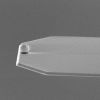

Tip Shape: Sphere, Gold
Sphere Diameter: 1.5 - 9 µm
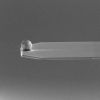

Tip Shape: Sphere, Borosilicate Glass
Sphere Diameter: 2.5 - 20 µm
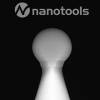

Tip Shape: Sphere, Diamond-Like-Carbon
Sphere Diameter: 0.04 µm
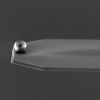

Tip Shape: Sphere, PMMA
Sphere Diameter: 1.84 - 14.59 µm


Tip Shape: Sphere, Diamond-Like-Carbon
Sphere Diameter: 0.04 µm
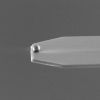

Tip Shape: Sphere, Polystyrene
Sphere Diameter: 1.98 - 14.45 µm


Tip Shape: Sphere, Diamond-Like-Carbon
Sphere Diameter: 0.04 µm
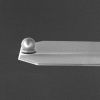

Tip Shape: Sphere, Silicon Dioxide
Sphere Diameter: 2 - 15 µm
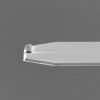

Tip Shape: Sphere, Gold
Sphere Diameter: 1.5 - 9 µm
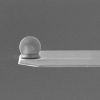

Tip Shape: Sphere, Borosilicate Glass
Sphere Diameter: 2.5 - 20 µm


Tip Shape: Sphere, Diamond-Like-Carbon
Sphere Diameter: 0.06 µm
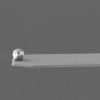

Tip Shape: Sphere, PMMA
Sphere Diameter: 1.84 - 14.59 µm


Tip Shape: Sphere, Diamond-Like-Carbon
Sphere Diameter: 0.06 µm
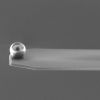

Tip Shape: Sphere, Polystyrene
Sphere Diameter: 1.98 - 14.45 µm


Tip Shape: Sphere, Diamond-Like-Carbon
Sphere Diameter: 0.06 µm
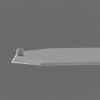

Tip Shape: Sphere, Silicon Dioxide
Sphere Diameter: 2 - 15 µm
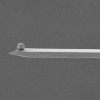

Tip Shape: Sphere, Gold
Sphere Diameter: 1.5 - 9 µm


Tip Shape: Sphere, Diamond-Like-Carbon
Sphere Diameter: 0.08 µm
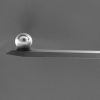

Tip Shape: Sphere, Borosilicate Glass
Sphere Diameter: 2.5 - 20 µm


Tip Shape: Sphere, Diamond-Like-Carbon
Sphere Diameter: 0.08 µm








